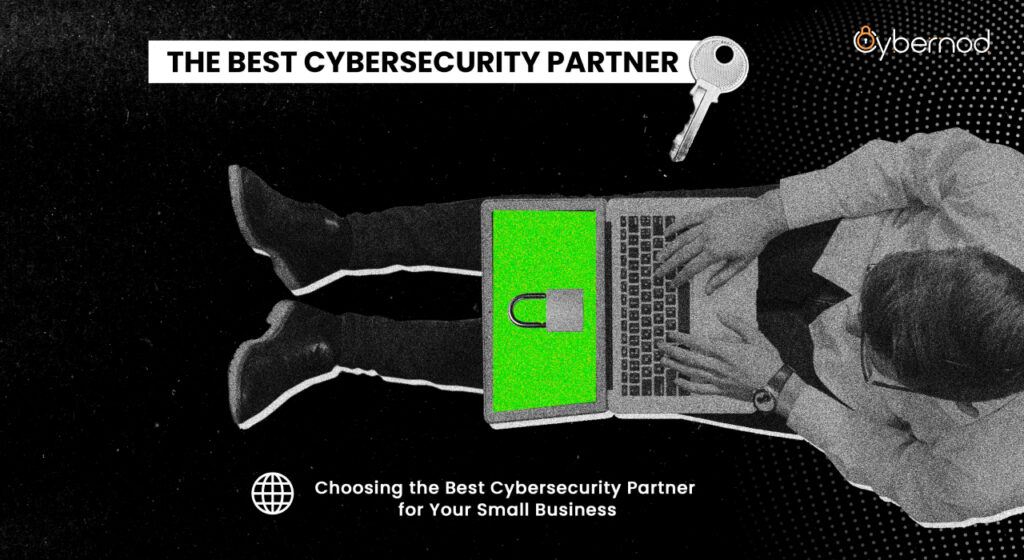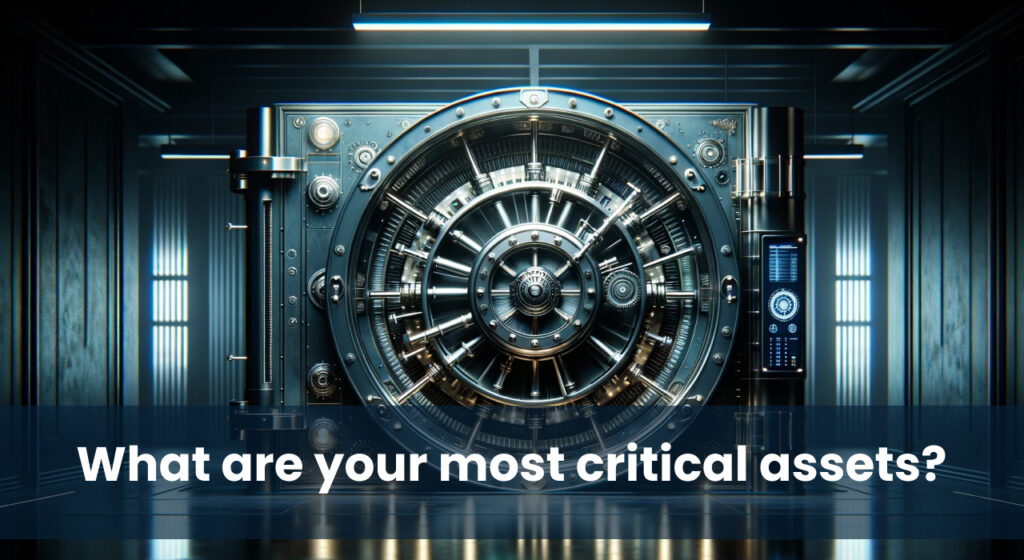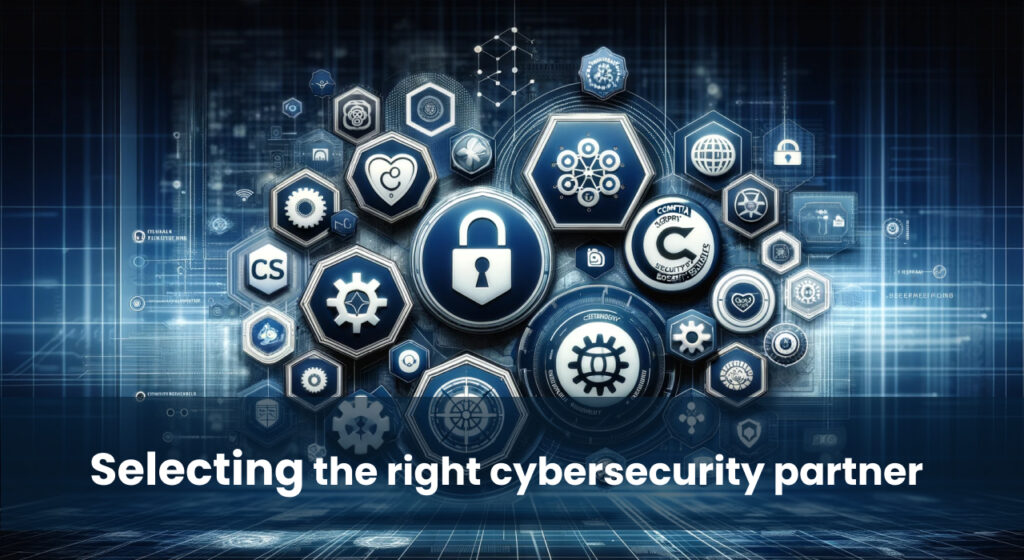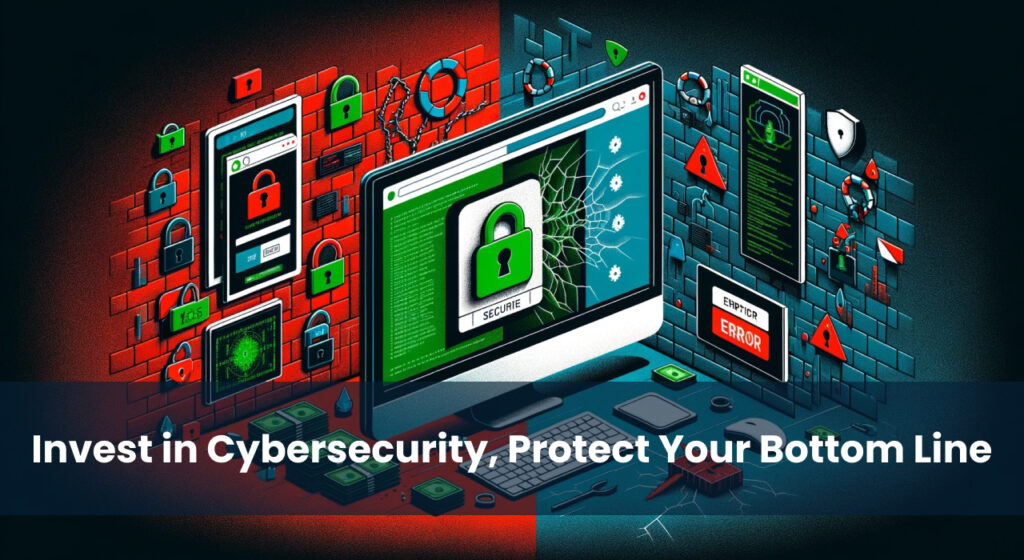
In today’s digital age, small businesses are facing an ever-growing onslaught of cybersecurity threats. From sophisticated phishing scams to malware attacks, cybercriminals are constantly evolving their tactics to exploit vulnerabilities. While large corporations have the resources to dedicate entire teams to cybersecurity, small businesses often lack the expertise and manpower to adequately protect their critical data and systems. This lack of robust cybersecurity measures can expose them to devastating consequences, including:
- Financial losses: Data breaches can result in significant financial costs to recover lost data, repair damaged systems, and comply with data protection regulations.
- Reputational damage: A cyberattack can erode customer trust and damage the business’s reputation, potentially leading to lost sales and decreased market share.
- Operational disruptions: Malware or other attacks can cripple business operations, causing downtime and hindering productivity.
However, there’s hope. By partnering with a reputable cybersecurity provider, small businesses can gain access to specialized expertise and advanced solutions that are beyond their internal capabilities. These providers can help businesses:
- Identify and address vulnerabilities: Conduct thorough security assessments to identify weaknesses in their systems and recommend solutions to mitigate risks.
- Implement comprehensive security measures: Implement firewalls, intrusion detection systems, and other security tools to protect against cyberattacks.
- Stay informed of the latest threats: Provide ongoing monitoring and updates to ensure businesses are aware of emerging threats and adjust their defenses accordingly.
- Respond to incidents effectively: Develop and implement a response plan to address security incidents efficiently and minimize damage.
To read the Ultimate Cybersecurity Assessment Guide for Small Businesses, click here:” The Ultimate Cybersecurity Assessment “
By leveraging the expertise of a cybersecurity partner, small businesses can take proactive steps to protect their assets, build resilience, and ensure their continued success in the digital landscape.
Understanding Your Cybersecurity Needs
It’s crucial to understand your specific cybersecurity needs before selecting a partner. This requires a two-pronged approach: self-assessment and understanding industry-specific risks and compliance requirements.

Self-Assessment:
- Identify your crown jewels: What are your most critical assets? This can include:
- Customer data: Names, addresses, financial information, etc.
- Financial data: Bank account details, payment processing information, intellectual property
- Intellectual property: Trade secrets, product designs, patents, etc.
- Internal business data: Operational plans, marketing strategies, employee information
- Evaluate the impact of a breach: Consider the potential financial losses, reputational damage, and operational disruptions that could occur if these assets were compromised.
- Inventory your technology infrastructure: Analyze your hardware, software, and network systems, including any cloud-based services you use.
Industry Risk Factors:
- Research common cyber threats specific to your industry. Here are some examples:
- Healthcare: Patient data breaches, ransomware attacks targeting medical records.
- Finance: Phishing scams targeting financial institutions and customers, malware targeting financial transactions.
- Retail: Credit card skimming attacks, data breaches targeting customer information.
Compliance:
- Determine if your business is subject to any data protection regulations such as:
- HIPAA: Protects the privacy of individuals’ medical information (healthcare industry).
- PCI DSS: Protects sensitive cardholder data (businesses that accept credit card payments).
- GDPR: Regulates the processing of personal data of individuals in the European Union (EU) and the European Economic Area (EEA).
- Compliance requirements will significantly impact your cybersecurity needs. Ensure your chosen partner has the expertise to address them.
By completing this self-assessment and understanding industry-specific risks and compliance requirements, you gain a clear picture of your cybersecurity landscape, guiding you towards selecting a partner who can effectively address your unique needs.
Key Considerations When Evaluating Cybersecurity Partners

Selecting the right cybersecurity partner for your small business requires careful evaluation. Here are some key considerations:
1. Experience and Specialization
- Prioritize vendors with proven experience in your industry. They will understand the specific threats and challenges faced by businesses in your sector.
- Seek companies with expertise in working with similarly sized organizations. Their solutions and approaches should be tailored to meet the needs of small businesses.
2. Services Offered
- Identify the range of cybersecurity services you require. This could include:
- Vulnerability scanning and patching: Regularly identifying and addressing weaknesses in your systems.
- Intrusion detection and prevention systems (IDS/IPS): Monitoring your network for suspicious activity and actively blocking attempts to gain unauthorized access.
- Managed detection and response (MDR): Utilizing security experts to continuously monitor your systems for threats and respond quickly to incidents.
- Security awareness training for employees: Educating your team to identify and avoid cyber threats.
- Incident response planning and preparedness: Developing a plan to effectively manage and mitigate security incidents.
Ensure the potential partner offers the full spectrum of services you need, or has the flexibility to integrate with your existing security solutions.
3. Certifications and Standards
- Look for vendors who hold reputable cybersecurity certifications, such as:
- Certified Information Systems Security Professional (CISSP): Demonstrates broad knowledge and experience in cybersecurity.
- CompTIA Security+: Validates foundational skills in cybersecurity concepts and practices applicable to any IT professional.
- GIAC Security Essentials (GSEC): A vendor-neutral certification covering fundamental security principles and applications.
4. Scalability
- Consider the future growth of your business. The ideal partner should be able to scale their services to meet your evolving needs.
- Choose a vendor with a track record of supporting businesses as they grow, ensuring they can continue to provide adequate protection and support as your company expands.
5. Communication and Transparency
- Clear and consistent communication is vital. Look for vendors who:
- Utilize well-defined communication channels to keep you informed of security risks and actions taken.
- Provide regular reports on the health of your systems and the effectiveness of security measures.
- Offer responsive support and are readily available to address your questions and concerns.
6. Reputation and References
- Conduct thorough research on potential partners. Check online reviews, case studies, and industry publications to understand their reputation and expertise.
- Request references from existing clients, especially those in your industry or with a similar size to your business. Speaking directly with satisfied customers can provide valuable insights into the vendor’s capabilities and service quality.
By carefully evaluating these key considerations, you can identify a cybersecurity partner who aligns with your business needs and provides the expertise and support necessary to effectively manage your cybersecurity risks.
The Evaluation Process
Choosing the right cybersecurity partner for your small business requires a structured evaluation process, ensuring you make an informed and effective decision. Here are key steps to follow:
- Creating an RFP (Request for Proposal):
- An RFP outlines your specific needs and requirements and allows vendors to submit formal proposals for your evaluation.
- Include the following in your RFP:
- Company background and industry: Briefly describe your business and operating environment.
- Security needs and goals: Clearly articulate your desired outcomes, e.g., improve vulnerability management, enhance incident response capabilities.
- Services required: Specify the specific services you require from the partner.
- Budget constraints: Provide an estimated budget range (if applicable) to guide vendor responses.
- Evaluation criteria: Outline the factors you will use to evaluate proposals, e.g., experience, pricing, references, etc.
- Issuing the RFP to multiple vendors allows for comparative analysis. Evaluate each response based on how well they address your specific needs and align with your evaluation criteria.
- Questions to Ask:
- Conduct in-depth interviews and/or demonstrations with shortlisted vendors.
- Prepare a list of critical questions to gain a deeper understanding of their capabilities and approach. This can include:
- Experience and expertise: Ask about their specific experience in your industry and with businesses of similar size.
- Services offered: Inquire about their specific service offerings and how they address your identified needs.
- Methodology and technology: Understand their approach to cybersecurity, the technologies employed, and how they ensure ongoing threat detection and protection.
- Incident response: Ask about their process for responding to security incidents, including communication protocols and timeframe for resolution.
- Scalability and future planning: Discuss their ability to grow with your business and adapt to evolving security threats.
- References: Request contact information for relevant client references to gain firsthand insights.
- Due Diligence:
- Don’t rely solely on vendor presentations. Conduct thorough due diligence to verify their claims:
- Perform background checks: Verify the company’s licenses, certifications, and financial stability.
- Review their own security practices: Evaluate their own cybersecurity posture to ensure they practice what they preach.
- Check online reviews and industry publications: Look for independent feedback and evaluations.
By combining the RFP process, asking insightful questions, and conducting thorough due diligence, you can ensure you select a cybersecurity partner who is well-equipped to address your unique needs and protect your business from the ever-evolving cyber threat landscape.
Cost Considerations and Budgeting
Securing your business against cyber threats is an investment, not just an expense. Understanding the various cost factors and budgeting effectively are crucial steps in choosing the right cybersecurity partner.

- Understanding Pricing Models:
Cybersecurity services are offered through various pricing models:
- Subscription-based: This recurring fee model provides access to a pre-defined set of services for a fixed monthly or annual cost.
- Per-device: This model charges based on the number of devices (e.g., computers, servers) requiring protection.
- Pay-as-you-go: This model charges based on the specific services used, offering flexibility but potentially lacking predictability in overall costs.
Several factors can influence the final cost:
- Complexity of your needs: The broader range of services required, the higher the cost will likely be.
- Industry and compliance requirements: Specific regulations might necessitate additional services, increasing the overall expense.
- Vendor experience and expertise: Highly specialized vendors may command premium fees compared to more general providers.
- The Value of Investment:
While the initial cost of cybersecurity services may seem substantial, it pales in comparison to the potentially devastating consequences of a data breach:
- Financial losses: Recovering lost data, repairing damaged systems, and complying with data protection regulations can be incredibly expensive.
- Reputational damage: A data breach can significantly impact customer trust and damage your brand reputation, leading to lost business opportunities.
- Operational disruptions: Business operations can be crippled by malware attacks or other security incidents, causing downtime and hindering productivity.
Investing in robust cybersecurity is essential for protecting your business’s long-term success and outweighs the potential costs associated with a cyberattack.
- Hidden Costs:
Be aware of potential hidden costs that may not be immediately apparent:
- Implementation fees: Setting up new security solutions might involve upfront implementation costs.
- Training and awareness programs: Training your employees on cybersecurity best practices can incur additional costs.
- Additional services: As your security needs evolve, additional services from your partner may be necessary, impacting cost.
Transparent communication with potential partners is key. Ensure you understand all fee structures, potential hidden costs, and the total cost of ownership before making a final decision.
Building a Successful Partnership
Selecting the right cybersecurity partner is only the first step. Building a successful and long-lasting partnership requires ongoing collaboration and effort from both parties.

- Clear Communication:
- Maintain open and transparent communication with your cybersecurity partner.
- Establish a designated point-of-contact on both sides to ensure clear communication channels and timely responses.
- Schedule regular meetings to discuss any concerns, ask questions, and stay informed about the latest threats and their ongoing efforts towards your security.
- Roles and Responsibilities:
- Clearly define the roles and responsibilities of both your business and the vendor. This includes:
- The business is responsible for:
- Providing accurate information about your needs and assets.
- Implementing internal security policies and procedures.
- Training employees on cybersecurity best practices.
- The vendor is responsible for:
- Delivering the agreed-upon security services.
- Monitoring your systems for threats and vulnerabilities.
- Promptly notifying you of any security incidents.
- Providing guidance and support in responding to incidents.
- The business is responsible for:
A clear understanding of roles and responsibilities minimizes confusion, ensures accountability, and fosters a collaborative environment.
- Incident Response Planning:
- Collaborate with your partner to develop a comprehensive incident response plan.
- This plan should outline:
- Steps to take in case of a security breach: This includes identifying, containing, eradicating, and recovering from the incident.
- Communication protocols: Defines how information will be disseminated internally and externally during an incident.
- Roles and responsibilities: Clarifies individual and team responsibilities during the response process.
- Disaster recovery procedures: Outlines steps to restore critical systems and data in case of an outage.
By having a pre-defined plan in place, your business will be better equipped to respond to security incidents efficiently and minimize potential damage.
Building a strong and collaborative partnership with your cybersecurity provider is essential for proactive protection, effective incident response, and long-term cybersecurity success.
Navigating the complex and ever-evolving cybersecurity landscape can be overwhelming for small businesses. Selecting the right cybersecurity partner can be a daunting task, but by understanding your specific needs, evaluating potential partners thoroughly, and building a strong collaborative relationship, you can significantly enhance your cybersecurity posture and protect your valuable assets.
Remember the critical aspects of selecting a partner:
- Self-assess your needs: Identify critical assets, industry risks, and compliance requirements.
- Evaluate potential partners: Prioritize experience and industry expertise, assess services offered, and ensure certifications and scalability.
- Conduct due diligence: Utilize RFPs, ask insightful questions, and verify the vendor’s own security practices.
- Consider cost and value: Understand pricing models, acknowledge the value of investment, and be aware of potential hidden costs.
Foster a successful partnership: Maintain clear communication, define roles and responsibilities, and collaborate on incident response planning.
Investing in a strong cybersecurity partnership is not a one-time decision but an ongoing commitment to securing your business. By partnering with a reliable and experienced provider, you gain access to essential expertise and tools to mitigate cyber risks, safeguard your data, and ensure your long-term success in today’s digital world.
Resources:
- National Institute of Standards and Technology (NIST) Cybersecurity Framework: https://www.nist.gov/cyberframework
Other Resources:
- Cybersecurity and Infrastructure Security Agency (CISA): https://www.cisa.gov/
- National Institute of Standards and Technology (NIST): https://www.nist.gov/
- Business Software Alliance (BSA): https://www.bsa.org/
By investing in the right resources and tools, you can significantly reduce the risk of a cyberattack on your business.
Categorized in:
Comments